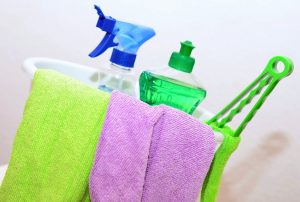 With the continued spread of COVID-19 across the world, governments, certain organisations, as well as the science world are constantly providing advice both at a business level and an individual level. Out of all the advice provided at various stages, there is one vital piece that always remains the same; hygiene practices must be strict and without exception. As time goes by the need for a deep clean against coronavirus will become more necessary. Business owners have the responsibility of caring for the health of the people they employ. Organising a deep clean, such as electrostatic cleaning in the UK, can help business owners to protect their workers while also keeping their premises open.
With the continued spread of COVID-19 across the world, governments, certain organisations, as well as the science world are constantly providing advice both at a business level and an individual level. Out of all the advice provided at various stages, there is one vital piece that always remains the same; hygiene practices must be strict and without exception. As time goes by the need for a deep clean against coronavirus will become more necessary. Business owners have the responsibility of caring for the health of the people they employ. Organising a deep clean, such as electrostatic cleaning in the UK, can help business owners to protect their workers while also keeping their premises open.
Risk Areas within the Office
What are the risky areas within the office environment for germs, and potentially COVID-19, being easily spread? These spots are areas where many people come into physical contact with the same equipment. Desks, telephone mouthpieces, computer mouse keyboards and so forth are all extremely inviting places for germs to hang around. As well as these spots, shared areas like meeting rooms, kitchens, toilets, and reception spaces are also high-risk areas as many people crossover within one area. A coronavirus deep clean targets these areas. Most of the layout of the office falls under these hot spot areas, hence the need to always keep on top of hygiene within the office.
Knowing the Virus Inside Out
Being a business owner likely means that you have already informed yourself on the coronavirus and what it entails. It is also important to instruct all employees that they should self-isolate if they have any symptoms. Instead of using the broad cover of ‘flu-like’ symptoms, it is best to be specific with these two main indications that a person may have the virus:
- A continuous cough that is new;
- Running a high temperature.
What is Involved in a Deep Clean?
Deep cleans involve an entire area being intensely cleaned within one time-frame. This contrasts to a regular clean where various areas are focused on at one time, while the overall cleanliness is no so much the priority. Once the office comes out of a deep clean it has been disinfected from top to bottom. When a deep clean is being carried out in response to contamination the crucial element is that of speed. In addition, the methods used to disinfect must be fully reliable.
The Option of Electrostatic Deep Cleaning
An electrostatic deep clean involves spraying electrostatically charged particles over all equipment and surfaces within a specific area. These particles adhere strongly to the surfaces they come into contact with allowing for fuller coverage of sanitation. This method is also twice as fast as using traditional cleaning methods of deep cleaning. Hence the whole process can be done within a quicker timeframe and with fewer personnel. This translates into a more reasonable price.
Timeframe Required for Deep Cleaning
If an employee has been diagnosed with COVID-19 a business may opt for a deep clean. Other businesses may decide a deep clean is a worthwhile precautionary measure. If employees within the business are currently working remotely, the timing is perfect to schedule a preventative deep clean. This means that when your staff start to work from the office again the risk of contamination is much lower.
The Current Advice for all Business Owners
The current advice from the government is not to close workplaces, however, when it is possible for workers to continue remotely this is preferred. Hence, the staff are now free to work within the office although many employers are doing what they can to enable employees to work from home. The line of work and remote working practices possible for any given business will determine the direction they take on this.
How is the Future Looking?
The idea that coronavirus illnesses could be the norm for several years to come has been predicated by experts within the field. Hence workplaces may need to boost their office hygiene standards. Keeping a high level of cleanliness goes a long way to prevent illness. Hence your regular cleaning schedule should also include timely deep cleans.